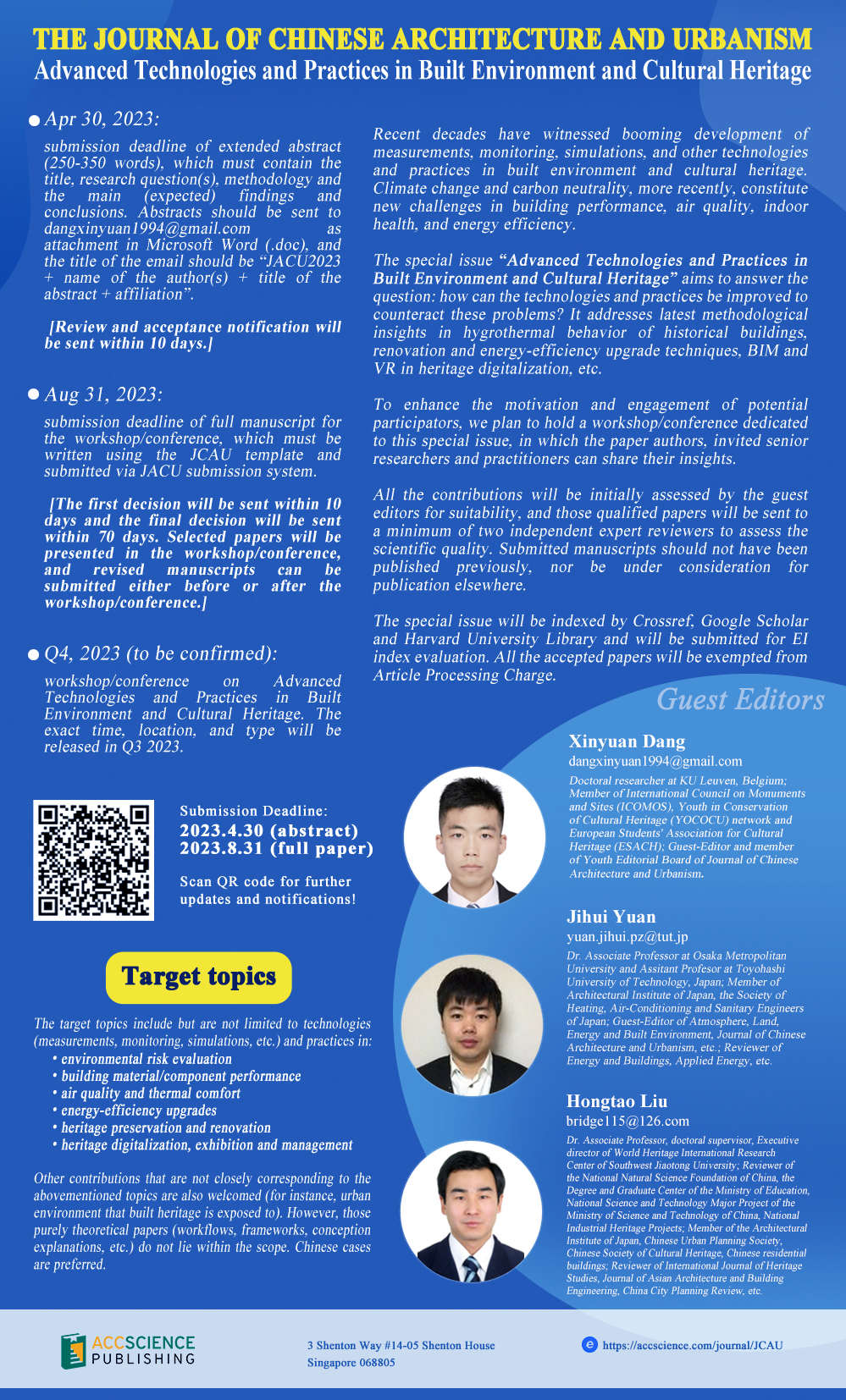
Recent decades have witnessed booming development of measurements, monitoring, simulations, and other technologies and practices in built environment and cultural heritage. Climate change and carbon neutrality, more recently, constitute new challenges in building performance, air quality, indoor health, and energy efficiency.
The special issue “Advanced Technologies and Practices in Built Environment and Cultural Heritage” aims to answer the question: how can the technologies and practices be improved to counteract these problems? It addresses latest methodological insights in hygrothermal behavior of historical buildings, renovation and energy-efficiency upgrade techniques, BIM and VR in heritage digitalization, etc.
To enhance the motivation and engagement of potential participators, we plan to hold a workshop/conference dedicated to this special issue, in which the paper authors, invited senior researchers and practitioners can share their insights. All the contributions will be initially assessed by the guest editors for suitability, and those qualified papers will be sent to a minimum of two independent expert reviewers to assess the scientific quality. Submitted manuscripts should not have been published previously, nor be under consideration for publication elsewhere.
The special issue will be indexed by Crossref, Google Scholar and Harvard University Library and will be submitted for EI index evaluation. All the accepted papers will be exempted from Article Processing Charge.
The target topics include but are not limited to technologies (measurements, monitoring, simulations, etc.) and practices in:
- environmental risk evaluation
- building material/component performance
- air quality and thermal comfort
- energy-efficiency upgrades
- heritage preservation and renovation
- heritage digitalization, exhibition and management
Other contributions that are not closely corresponding to the abovementioned topics are also welcomed (for instance, urban environment that built heritage is exposed to). However, those purely theoretical papers (workflows, frameworks, conception explanations, etc.) do not lie within the scope. Chinese cases are preferred.
Important dates:
- Apr 30, 2023: submission deadline of extended abstract (250-350 words), which must contain the title, research question(s), methodology and the main (expected) findings and conclusions. Abstracts should be sent to dangxinyuan1994@gmail.com as attachment in Microsoft Word (.doc), and the title of the email should be “JACU2023 + name of the author(s) + title of the abstract + affiliation”. [Review and acceptance notification will be sent within 10 days.]
- Aug 31, 2023: submission deadline of full manuscript for the workshop/conference, which must be written using the JCAU template (https://accscience.com/journal/JCAU/instructions#Guide1) and submitted via JACU submission system. [The first decision will be sent within 10 days and the final decision will be sent within 70 days. Selected papers will be presented in the workshop/conference, and revised manuscripts can be submitted either before or after the workshop/conference.]
- Q4, 2023 (to be confirmed): workshop/conference on Advanced Technologies and Practices in Built Environment and Cultural Heritage. The exact time, location, and type will be released in Q3 2023.
Updates and further notifications can be found at the special issue page of JCAU:
Building energy-saving mechanism for indoor cooling temperature set-point with different envelope: A case study in Guangzhou
Exploring the spatial attributes of streets in Lu Xun’s hometown of Shaoxing, China, through image semantic segmentation
Digital twin applications in an archaeological site: A virtual reconstruction of the Pishan site, Zhejiang, China
Residential urban heritage space identification, delimitation, and potential assessment model based on space syntax
Insights from “Advanced Technologies and Practices in the Built Environment and Cultural Heritage”




